Kathleen M. Basi's Blog, page 29
May 2, 2016
In Which A Conversation With A Homeless Man Shapes My Future Self
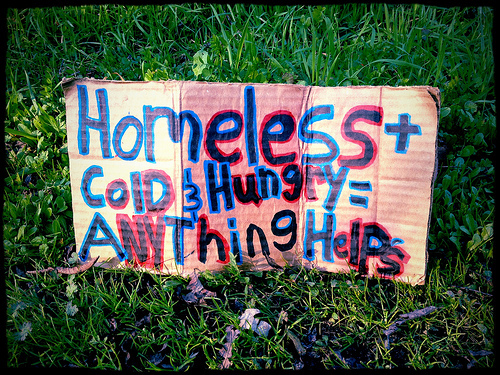
Photo by The Digital Story, via Flickr
The light at the top of the exit ramp was red when I pulled up to it. There was a man there. Grizzled. Curly beard. I recognized him. I’ve given him protein bars before. I pulled one out of the box between the seats and rolled down my window. “Here you go,” I said.
“Oh, thank you, ma’am!” he said. “That’s what I’m lookin’ for, is food.”
The light was red. What was I supposed to do now? Roll my window up and ignore his existence?
“Do you…do you have a place to go?” I asked.
He gestured to the opposite crook of the cross formed by four-lane roads. “Naw. I been sleepin’ down in those trees. It’s been pretty chilly lately.”
“I was going to say, it’s not been warm…” I eyed his thin jacket. “Do you have a tent or something, at least?” (Which is not as stupid a question as it might sound. We’ve seen tent communities in highway right-of-ways before.)
“Naw.”
It was exactly the the thing I’ve always (to be perfectly frank) dreaded about making eye contact with the homeless people: the need to have a conversation. I want to help. But an introvert hates trying to connect to new people anyway, and what can I possibly say to this man, who survives with almost none of the things I consider to be basic necessities? As the light turned green, I said, “Well…”
He smiled. He was missing his two middle upper teeth. “God bless you, ma’am.”
“Take care of yourself,” I said. Lame. Totally lame, when it’s perfectly clear that this guy has almost none of what he needs in order to take care of himself, and I, even I who am driving around in a van with 130,000 miles on it and making do with one TV (which is still a picture tube)—I could easily buy him a tent and a sleeping bag and a backpack to haul it all around in, if I hadn’t bought, however unwillingly, into the narrative that says These People might just trade it for drink and drugs anyway. And if I hadn’t used the truth that “you can’t fix someone else’s problem” as an excuse not to bother trying.
My insides writhe to admit I’ve allowed my own practice of mercy to be so small, so petty, and so accepting of blanket judgments.
But as I made the left turn and headed for home, I thought of Jesus saying, “The poor you will always have with you.” And how I’ve heard people who work with the poor say the goal is to provide today’s needs. That we don’t have to feel guilty because we’re not providing an ongoing monthly budget and a 401(k).
And I think of Oskar Schindler in the movie, crying, “I could have done more. I could have saved more.”
And I thought, this is what it means to practice mercy. To know it’s not enough. To feel uncomfortable in recognizing the extent of my own privilege. To live with that discomfort, and let it shape my choices today, the ones that build the person I will someday be.
Find more “Mercy on a Monday” posts here.


April 29, 2016
Playing Favorites

Image by Rusty Ross, via Flickr
I can’t be the only parent who lives in dread of playing favorites.
Especially of having a “favorite child.”
The online “soundtrack” of parenting reflections has presented me more than once with the theory that you butt heads with the child who resembles you most. But I think this is only true for certain personality types. If you are a strong-willed individual, committed to your own opinions above the approval of others, whose vision of the world is so clear that you can’t always put yourself in others’ shoes—if you have a child who mirrors you in these attributes, yes, you are almost certain to butt heads.
But if you are an introverted, deeply analytical puzzler who is very sensitive to the approval and opinions of others, and who values getting along more than getting your own way? If you have a child who mirrors you in these attributes, you’re not going to butt heads. You’re going to recognize each other as kindred spirits.
And if you have one child who completely befuddles you, because none of their choices make any sense to you as a person who values cooperation and compromise, you are going to struggle more to show that child love in the way he or she will recognize it.
I do not accept, however, that this constitutes playing favorites. Having such a child requires a parent to expend far more mental, emotional and spiritual energy trying to work out the puzzle that is that child, to figure out how to speak to and guide that child’s soul, and help them feel that they are loved. Far more than the children you just “get” instinctively. It’s way more work, and you might not always do it well, but the commitment is real and so is the love behind it.


April 25, 2016
Pictures From The Big Day
A young lady’s big day in the Basi household begins with dancing with your little brother…
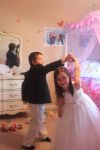
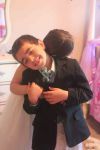
…continues with joining the choir for one of your favorite songs (“Love Has Come, by Matt Maher”)…

…peaks with receiving your first Communion (officially this time)…

My favorite picture of the day. Unfortunately, it’s trimmed so much, the quality’s note great. Sorry.

…forces you to tolerate having lots and lots of pictures taken….

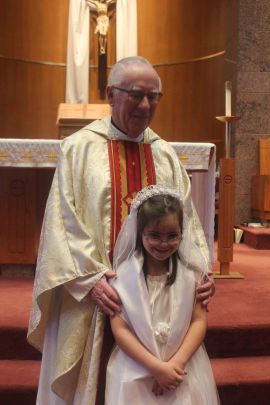
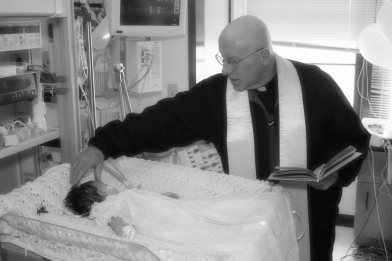
(There’s a wonderful symmetry to having this man present to administer her first two sacraments of initiation, nine years apart.)
And of course, it’s not so hard to smile when you have cousins and grandparents to pose with…
Click to view slideshow.
…and when you get cards and presents and singing, it’s a good day all around. But for mommies, the most fun is seeing cousins from both sides of the family making friends. I call this cross-pollinating cousinship. They’re already plotting a pool party together this summer. To me, that spells success!

That’s First Communion Day in the Basi house! And today is Alex’s birthday. If you want to fill up the comboxes with well wishes, it will make my kids’ day.[image error]


April 22, 2016
Being part of something bigger than me (reflections on music)

Photo by Jesse Kruger, via Flickr
Occasionally, someone asks me when I’m going to record an album. I always hesitate to answer, because even though I know I’m not a good enough singer to record an album, it seems kind of…ungracious…to contradict people who obviously think otherwise. But there’s another reaction that I never quite know how to explain—a deep, visceral recoil. I am a leader of community song and a facilitator of beautiful music. I am not a rock star—either in the literal or the metaphorical sense.
I haven’t always felt that way. When I was in school, it was a matter of extreme angst to me how much time I spent on piccolo or second flute instead of principal. I really craved those solos.
But gradually I realized I like playing second. There’s a different kind of intellectual and musical challenge involved in immersing yourself so deeply in someone else’s pitch and tone that you simply disappear. There’s magic in those moments, a thrill that I find much more satisfying than the stressful adrenaline rush of the spotlight.
Getting deeply involved in pastoral music really crystallized that. As a liturgical flute player, the goal is not to draw attention to myself, but to add color and beauty, to touch the heart and draw it closer to God. In that context, music serves the words—an idea that once made me grind my teeth. But now it seems inevitable and utterly right. Music makes it possible for words to imprint permanently on the soul without effort.
The last few weeks, I’ve been playing second flute on Prokofiev’s Alexander Nevsky (pronounced Nyevsky, in case you’re wondering) and fourth flute on Stravinsky’s Symphony of Psalms. The last time I played the Symphony of Psalms, I was playing principal. After twenty-two years, my fingers can still trace the finger patterns of the solos. And yet it’s been at least as fulfilling this time around. Perhaps more so, because I can really feel that I am a part of the tapestry, a part of something much bigger than me.
See, the world of a novelist/feature writer is very isolated. Yes, you do interviews, you have critique partners and editors, and eventually you invite people into your world. But no one ever immerses themselves in your world as fully as you do. Not even other writers want to delve that deep with you.
Music is totally different. You may practice in isolation, but you can’t play the Symphony of Psalms by yourself. You need five flutes, five oboes, 3 bassoons and a contrabassoon, two pianos, harp, a huge array of brass, and low strings—and that’s before we mention the singers (and the conductor!). Music is defined by its communality. We all delve into the experience together, dependent upon each other. People who have never met can rehearse for a few hours and suddenly discover that they can match pitch and note lengths, sometimes without exchanging a single word to make it happen. Music communicates at a level so much more visceral, so much closer to the soul, than words alone.
I used to resent accompaniment parts. But these days I love them—even those ridiculous sustained notes, the ones where whole notes are tied together, followed by a whole note tied to a half note, and two halves tied over a bar line, and why are you even re-articulating the same note anyway?
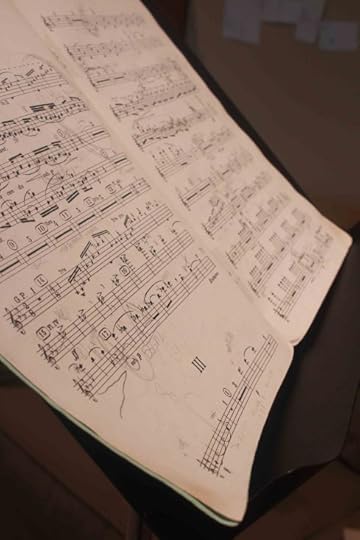
You can see those dark “page turn” spots in the corner
I can see now the dimension and shape in those notes, and even if nobody in the audience notices the difference, they’ll feel it. I no longer mind playing in the mid-register where I know it’ll never carry over the orchestra, because I recognize I’m part of something so much bigger. I love that sense of being one puzzle piece in a beautiful picture. You could still see the picture if one piece is missing, but only when every piece is in place is the full beauty revealed.
And it’s bigger than our one performance, too. The Symphony of Psalms is a rental piece, so my part came into my hands bearing notes from the person who played it last—and dark spots at the bottom of each well-worn page, where countless fingers not so different from mine left their mark while turning pages on stages not so different from the one I’m using, surrounded by the same glorious sound.
 Best of all was the fact that last night, when I arrived for the concert, I did not arrive alone. I had Nicholas with me, and we’d had a bona fide “date night” dinner at Taco Bell, just the two of us. He got to sit in the audience, with a real live, paid ticket. He got to come up afterward and go backstage with me. See the tight spiral staircase that accesses the catwalks. Go down the steep, narrow stairway to the dressing rooms beneath the stage. Meet and talk to Jane Bunnell, who sang the gorgeous “Field of the Dead” solo in Nevsky. (And his compliments to her were both effusive and unprompted, which was the coolest thing of all.)
Best of all was the fact that last night, when I arrived for the concert, I did not arrive alone. I had Nicholas with me, and we’d had a bona fide “date night” dinner at Taco Bell, just the two of us. He got to sit in the audience, with a real live, paid ticket. He got to come up afterward and go backstage with me. See the tight spiral staircase that accesses the catwalks. Go down the steep, narrow stairway to the dressing rooms beneath the stage. Meet and talk to Jane Bunnell, who sang the gorgeous “Field of the Dead” solo in Nevsky. (And his compliments to her were both effusive and unprompted, which was the coolest thing of all.)
Last night was one of those nights when I was reminded how big and beautiful and interconnected and, especially, how rich music has made my life. And getting to share it with one of my children—and this child, in particular? That made it a perfect night.


April 20, 2016
Walk In The Woods: A Photo Essay
This week, every single thing that makes life busy is converging upon one week: looming deadlines, baseball, piano, horseback, lessons, choir, two family visits, First Communion, a bake sale for the fifth grade, and to top it off, I am playing in a concert on Thursday, which means I have long, late rehearsals. So this little photo essay, of a walk in the Gans Creek Nature Area, will stand in my corner of the e-universe until Monday. Hope you enjoy!

I’m a sucker for trails where the trees form a tunnel.
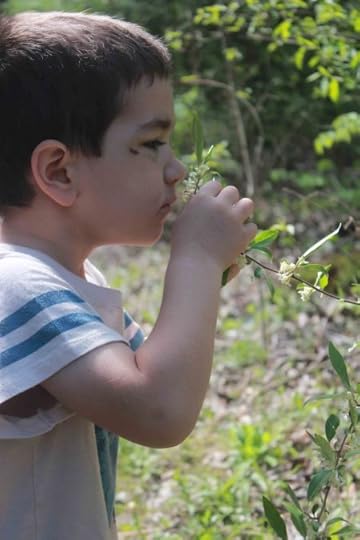
My walking companion enjoys the wild honeysuckle

A wild phlox bloom that was so far from any plant, I can only assume some little hands carried it up the hill and dropped it in the middle of the path.

“Spring Beauty”




Wild violets

This mossy rock looks to me like a magic isle. Like you could almost step into another world.



April 18, 2016
When Forgiveness Seems Impossible
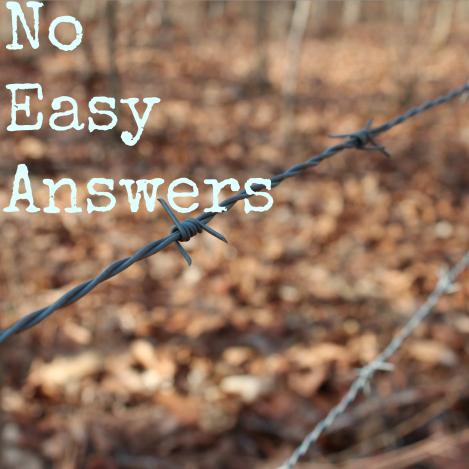 There are offenses that we as a culture consider unforgivable. Murder, child molestation, adultery: These are the three that come to mind right now. Crimes that seem to absolve us from the responsibility of offering forgiveness and reconciliation.
There are offenses that we as a culture consider unforgivable. Murder, child molestation, adultery: These are the three that come to mind right now. Crimes that seem to absolve us from the responsibility of offering forgiveness and reconciliation.
How do we apply “mercy” in these situations?
I’m not going to pretend I have a pat answer. I don’t. But too often our society as a whole or individuals within it make clear, by their words and actions, that some violations of human dignity place the offender irrevocably beyond redemption. And if we as Christians, and Catholics in particular, are going to be serious about this extraordinary jubilee year of mercy, we have to wrestle with the reality that this isn’t how God would have us approach life’s hardest questions.
1: Capital Punishment.
The language of capital punishment is couched in “justice,” but it’s certainly not a Christlike vision of justice. Execution doesn’t bring a murder victim back; it only satisfies human desire for revenge. There are all the practical arguments about the gargantuan expense of automatic appeals, and then there is this:
2. Sexual Abuse.
Child molestation is a hard case, and especially so within the Church, where we’ve seen abuse of power by some priests, and a tendency by the hierarchy to prioritize protecting its own over protecting the vulnerable. But don’t forget that molestation happens just as often, maybe more, within families, schools and other community organizations. In all these cases, a sincere desire to do good has gotten twisted into something ugly and damaging to both victim and perpetrator. But how did that twisting take place? People don’t become abusers in a vacuum. We reserve all our mercy for the children and act as if the perpetrator deserves none, even though many of them were themselves victims at one point. Are they not also in need of our mercy?
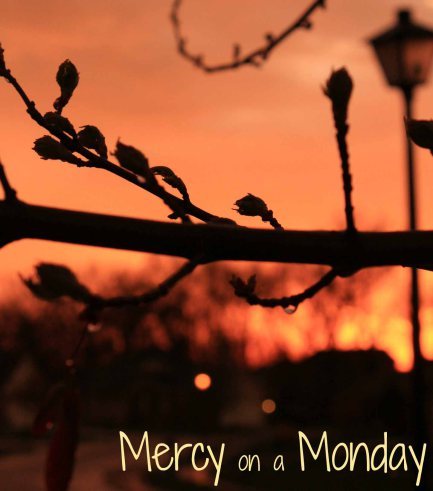 3. Infidelity.
3. Infidelity.
And then there’s adultery—considered by many as the one deal-breaker in a marriage, the only offense a spouse doesn’t have to forgive. Yet the vows we offer when we marry don’t include asterisks. It’s frighteningly easy for marriages to get clogged up with resentments, demands, and failures to communicate. Those inevitably flow in both directions, and they can drive people to betray the one they love most. In the aftermath of infidelity, there’s a hard choice to be made: Do you just throw away the years you’ve spent together, the love you have shared? Or do you try to address the problems and make a new start? It’s hard, painful work to reclaim a marriage, but I’ve seen it done, and it begins with mercy.
Mercy posts, I am discovering, almost inevitably double as “No Easy Answers” posts. Mercy issues a huge challenge to our human sense of justice. We don’t want to see gray areas. We want to classify people as bad guys and good guys, and see the good guys rewarded while the bad guys are punished. But if we are to be followers of Christ, we have to strive to see the world as he did, not as we would.


April 15, 2016
#AmWriting: More “Extreme Adventure” Than “Holy Grail”

Photo by ezhikoff, via Flickr
When I first started writing, I had this vision of how it would be. In my mind’s eye, the whole concept was shrouded in a beatific glow. It wasn’t that I expected to spend all my writing time wrapped in that glow—it was just that the idea itself took on the attributes of a holy grail.
I still see it that way, but I often have to laugh at how very not beatific the process itself is.
Exhibit A: My very first conversation with Liguorian magazine, about the column that would be “Just Live It,” took place in my room, with two children in the bathtub next door, flinging water onto the tile floor while I was distracted. So much water that it took two bath towels to sop it up. (That ended up in the column, by the way.)
Writers often ask each other, “What kind of music do you listen to while you write?” Those who know me primarily as a musician might be surprised to know that I can’t listen to anything at all. My ear is trained toward music and if music plays, it takes over all my attention. Think of it this way: when you’re a mother (I specify “mother” because in my experience this phenomenon does not apply to fathers), no matter how deeply immersed in something else you are, the instant one of your children’s voices tickles your eardrums, you completely lose the train of thought. You could be talking to the President of the United States or Pope Francis himself about the one thing only you can do to save the universe, but if your child said, “Mommy, my cereal is like two doors,” you would hear only your child. Am I right?
I have that problem while writing, too. (This very moment, in fact. Michael is asking me about the shapes in his Lucky Charms. Generic, of course. And then asking where his magic wand is. And then running laps while very nearly crashing into walls at both ends of the house.)
This is why I don’t
(MOM YOU HAVEN’T HAD BREAKFAST YET YOU HAVE BROWN ON YOUR CHIN CAN WE SHARE THIS NAPKIN?)
often exercise at 5:30 a.m. anymore. I need every moment of “no kids around” time to focus on work.
Exhibit B: what was going on while I was preparing novel query letters:

Which is probably how this happened:

…oh and also, at the same time, this:

I had to pause to kiss a little boy’s dirty stubbed toe, too.
I had a Very Important Phone Call on Monday while I was preparing after-school snacks. And another one on Tuesday in the van while driving to piano lessons. And despite being prepared with the words, “When this call comes, I have to take it,” the kids continued to interrupt me to ask why the sky was blue and why traffic lights are red, all the way there.
In the summertime, I keep earplugs in the drawer of my computer desk. Which sometimes makes it possible to work despite the boys playing Batman or Avengers ten feet away.
 For years, I did half my writing one-handed because the other hand was occupied helping a baby to breastfeed. Now I do it one-handed because someone wants to snuggle, and there’s no way I’m giving up a snuggle. Even for the Holy Grail of Writing.
For years, I did half my writing one-handed because the other hand was occupied helping a baby to breastfeed. Now I do it one-handed because someone wants to snuggle, and there’s no way I’m giving up a snuggle. Even for the Holy Grail of Writing.
So
(WHAT’S THIS IN MY FINGER MOM?)
when I think of writing now, the concept is still surrounded by passion and reverence, but I’m always painfully (beautifully painfully, but painfully nonetheless) aware of the gap between that
(OH MOMMY, WE NEED TO RECYCLE THIS! CAN I CAN I CAN I, READ THE LITTLE MERMAID BOOK?)
vision and the messy reality.
And now you can more fully appreciate what goes into the finished product you read or sing on Sunday mornings!


April 13, 2016
Michael Takes A Bow
 Every so often a mama has to enshrine the kid moments, even if they’re not any more witty, hilarious, or indicative of genius than any other child in the universe. Today it’s Michael’s turn.
Every so often a mama has to enshrine the kid moments, even if they’re not any more witty, hilarious, or indicative of genius than any other child in the universe. Today it’s Michael’s turn.
*******
“Mommy, Mommy!” he cried as we turned past a convertible onto a quiet residential street the other day. “I saw a dark blue car that, that had, that WOST its TOP!”
*
The next day, he had his first major spill from a bicycle. Major, I label it, based solely on his reaction. Normally he shakes off all owies. Or he’ll come to me and say, “Mommy, my ____ hurts,” and I kiss it a couple of times before I go in for the chew, and he giggles and it’s done.
Not so with this. It was the most minor strawberry you can imagine, but he would not calm down. I was beginning to wonder if there might actually be some internal injury, he was so uncharacteristically hysterical–although I dismissed that possibility, because he was moving just fine, and he kept laughing when I told him not to smile.
Finally I said, “Hey! Are we going to have to go to the doctor and cut your whole leg off?”
He knows my sense of humor, so he giggled…and then returned to wailing and crying. And that was when I realized: he needed a nap. Badly.
Fast forward 24 hours. After everyone went to school I checked my calendar and realized I had (stupid unnecessary waste of time) well-child visits today. So when I picked him up from school, I told him, “Guess what? We’re going to go get the boys and go to the doctor today.”
“But I don’t WANT to go to the doctor!” yelled Michael.
Michael’s not one to panic about a doctor visit, so this gave me pause. “It’s no big deal, it’s just a ‘let’s see how you’re doing’ visit,” I said.
He spun around and got right in my face. “Are they going to cut my leg off?????”
I’m sure you will not grudge me the uncontrollable giggle I had to indulge before before I could reassure him.

I let the van get way, way too low on gas last week. I had the overhead display on Distance to Empty and we were all watching it jump up and down depending on whether we were coasting, sitting at a stoplight, or accelerating onto the interstate. And suddenly Michael called, “Mommy, I see thirty-six!” I was like, What? I glanced at the display, and sure enough, it said: 36.
“How do you even KNOW that number?” I said. “You are FOUR!”
*
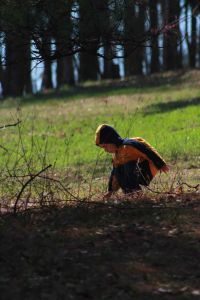 He spent the gap between lunch and nap time yesterday “helping” me with yard work. I was digging dandelions when he came running down the hill. “Mommy, I want to tell you something!”
He spent the gap between lunch and nap time yesterday “helping” me with yard work. I was digging dandelions when he came running down the hill. “Mommy, I want to tell you something!”
“Oh yeah, what’s that?”
“When we go inside, I want to snuggle with you.”
Now you know there’s no proper response to that except a good long snuggle in the long spring grass. And after that, he stuck with me. He spotted at least a dozen and a half dandelions that I would have missed. And when I had to get to work, he pushed his pop mower around the yard until he got bored, and then he climbed a tree.
There are days when motherhood is very, very sweet, even amid the madness.
I have things to say about madness, too, but this post was nearer finished, so it takes the spotlight today.


April 11, 2016
A Very Busy Weekend
In our house, a very busy weekend looks like….
Friday: me singing the national anthem at a softball game…
….then going home and cutting all the daffodils and covering the lilacs in advance of a freeze…

Much prettier in the house, anyway.
Saturday: Nicholas taking a gifted screening, and then heading eastward to meet up with one set of cousins at a playground beside Cousin’s baseball practice…

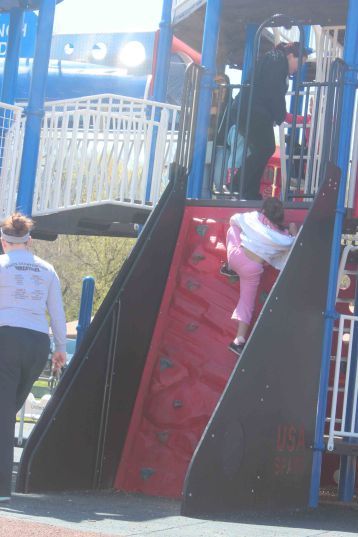
Julianna climbed this wall four times before she knew I was watching. And then, she played helpless until Big Brother Alex helped her. She knows how to manipulate.
All told, eleven kids, of whom two are….

BABIES!!!!!!


Sunday: Alex serving at Mass, followed by….
Click to view slideshow.
….followed by….

…followed by building for this:
And when I came home, I found that one member of the family had capitulated to exhaustion:

I feel ya, Boo Boy. We need a weekend from our weekend.


April 8, 2016
Sex Is A Good Thing

Photo by Sheep”R”Us, via Flickr
Whenever somebody talks about sex, ears perk up and strong reactions—both positive and negative—ensue.
For a long time, I saw that as a sign that there was something fundamentally wrong with humanity, something inherently sinful. But I’ve come to realize that I had it backwards. We have this reaction because there is something fundamentally right with us. No matter what hangups, dysfunctions and sexual wounds get piled upon us over the course of life, something at our core still recognizes sex and sexuality as the ultimate expression of our identity as human beings; it is the thing we hold closest to ourselves and the gift we take the most care in sharing.
This shift in understanding has come to me courtesy of Theology of the Body.
I was asked by Sarah Reinhard, an author friend, to share the impact TOB has had in my world. That turns out to be a harder question to answer than I thought, because it’s an ongoing process. TOB first opened up my mind to the interconnectivity of all subjects—the fact that everything we do, all our reactions, all our thought processes, are based upon a foundation of our identity as man and woman. More recently, TOB, and the ongoing will he-won’t he discussions about Pope Francis and birth control—have caused me to take a step back and try to see the issues surrounding sex with mercy as well as passion.
 But in practical terms, the most obvious impact has been in my marriage. I entered marriage with some pretty enormous hangups about sex. There were personal struggles to reconcile belief and experience, which I’d always been too afraid to bring into the open and thus they became monsters in my head. There was the fact that I was highly physically developed and extremely socially underdeveloped, and the resulting encounters with boys over the course of childhood and adolescence left me some pretty good-sized emotional scars. There was guilt for things I had done and knew I shouldn’t have.
But in practical terms, the most obvious impact has been in my marriage. I entered marriage with some pretty enormous hangups about sex. There were personal struggles to reconcile belief and experience, which I’d always been too afraid to bring into the open and thus they became monsters in my head. There was the fact that I was highly physically developed and extremely socially underdeveloped, and the resulting encounters with boys over the course of childhood and adolescence left me some pretty good-sized emotional scars. There was guilt for things I had done and knew I shouldn’t have.
And then a couple of years into marriage, of course, infertility piled a whole lot more dysfunction onto the fire. Your brain automatically labels infertility as a punishment, even though you know better.
So it was the Theology of the Body that began to help me put out fires, toss rubble away, and find at the core of my soul a healthier, more enjoyable and joy-filled approach to intimacy. This process is far from over, but I am in so much better a place now than I was then.
A few other posts I’ve written that show the impact TOB has had on my total world view:
Sex, Love, And Women’s Fiction
What It’s Like To Practice Natural Family Planning






